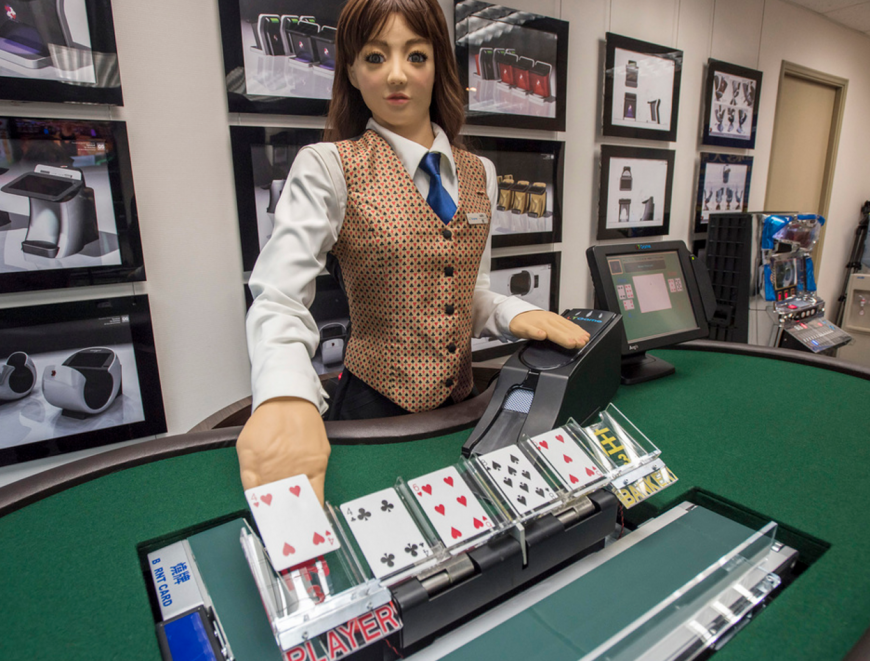How Much Casino Dealer Earn
Dec 17, 2019 How much does a Casino Dealer make? The national average salary for a Casino Dealer is $42,543 in United States. Filter by location to see Casino Dealer salaries in your area. Salary estimates are based on 27 salaries submitted anonymously to Glassdoor by Casino Dealer employees. How Much Can You Make? As with most industries, pay varies quite a bit.Some dealers report incomes near minimum wage, while others say they make up to $55,000 per year, according to Glassdoor. The Casino Institute says: An average Casino Dealer makes over $50,000 their first year based on a 40 hour work week.
Do you love the casino scene?
Does being a casino dealer seem like the perfect blend of glamour, excitement, and fun?
At first glance, being a dealer at a casino might seem like the perfect job. After all, you probably already enjoy the games you’ll be playing. And you will be getting paid to play them.
You don’t even have to risk losing any money while you play. The casino is banking all the action.
As a casino dealer, the amount you win for the house has no bearing on your pay, though. You get an hourly wage plus tips.
Compared to some jobs, being a casino dealer might be a great deal. As casino gambling continues to grow across the nation, more jobs become available, and fewer potential employees are out there to fill those jobs. This means wages are climbing, too.
This post examines how much you can expect to make as a casino dealer, tips and all.
What Is the Average Wage for a Casino Dealer?
How Much Does A Casino Dealer Earn
Your average wage as a casino dealer isn’t impressive at all. It’s a service industry, so when you calculate how much you’ll make, you need to take the same kind of mindset that waitresses and bartenders take:
How much money you make is based more on tips than on your hourly wage.
And the better you serve your customers, the more they’ll tip.
In other words, if you’re not a people person, becoming a casino dealer might not be a great idea.
The hourly wages for casino dealers don’t vary based on the game, either. Blackjack dealers make the same kind of money as baccarat dealers, who make the same kind of money as poker dealers or roulette dealers (or croupiers, as they’re called).
The starting pay for an average casino dealer is between $8 and $10 per hour. Some of that is based on experience, too.
If you’re able to get 40 hours a week, which is unusual, you’re looking at $16,000 to $20,000 per year. Most casino dealers, especially starting out, don’t get 40 hours a week, though.
That’s barely enough to pay the rent if you have a roommate and live in a cheap apartment.
Depending on the casino and the stakes of the games you’re dealing, you can expect to make anywhere from $15 per hour in tips to $50 per hour in tips, on average.
That $50 per hour figure, by the way, is an outlier statistic. This assumes you’re working at a high-end casino dealing the higher-limit casino games to the high rollers.
Even then, some high rollers don’t tip — or if they tip, they don’t tip well at all.
Poker dealers make the most money from tips on the most consistent basis, but a lot of this depends on people skills. In some casinos, the dealers are required to pool their tips.
I once played at a casino in Las Vegas with an older poker dealer named Boris. He got mad at me for saying the words “Carpe diem” at the table. He said that I was only allowed to speak English at the table.
Being a friendly guy, I smiled and explained to everyone at the table that the phrase is Latin for “seize the day.”
Boris didn’t think that was helpful, either. He was surly and rude.
As a result, I didn’t tip him.
I shared the story with a professional poker player friend of mine, and he told me that he would have raised hell with the cardroom manager until Boris had been fired.
And the thing is… I don’t mind a little correction. In fact, I’m a humble guy. Had he been reasonably friendly and polite about it, I would have continued to tip him. So it goes.
Also, just because you’re dealing a higher-stakes poker game doesn’t mean you’ll make more in tips. Some of the high-rolling poker players are notorious cheapskates. If you’re dealing high-roller blackjack, craps, or roulette, you’ll do a lot better than if you’re dealing high-limit hold’em.
According to Glassdoor, the average wages for dealers and related jobs are all over the place. They suggest that the average dealer makes $40,000 a year. They also suggest that an average poker dealer only makes $20,000 a year.
Other related jobs include the floor supervisor, with an average salary of $53,000 a year, a casino host, with an average salary of $35,000 a year, and a casino shift manager, with an average salary of $27,000 a year.
The site also lists salaries by company, and it looks like Caesars is the best place to be a dealer, with a salary of $42,000.
Indeed.com has more survey results and suggests an average of $15/hour, which equates to $30,000 a year. They had a listing for a dealer position in Black Hawk, Colorado, where the starting pay was $38/hour. That’s $76,000 a year.
ZipRecruiter suggests that top dealers make $400,000 a year, but I can’t imagine that’s accurate. The rest of their averages are in line with what I saw on the other sites mentioned.
The Perks and Drawbacks of Being a Casino Dealer as a Career
If you know anything about the service business, you probably know that dealing with the customers can be the biggest perk and the biggest drawback to your job. This is especially true in the casino business, though, because emotions tend to be amped up when money is on the line.
You’ll probably spend a lot of time on your feet if you’re dealing table games in the casino. If you’re dealing poker in the cardroom, you’ll probably need to bring a pillow for some extra cushioning at your chair.
One of the other drawbacks of being a casino dealer is that it turns what used to be a leisure activity into a work activity. Playing blackjack is great when you get to do it a couple of times a year for a few hours at a time.
But after dealing blackjack for 30 hours a week for six weeks straight, it becomes drudgery.
In most casinos, smoking is still allowed. That might or might not bother you. I’ve spent enough time in bars and AA meetings that cigarette smoke doesn’t bother me at all, but I’m not like most people.
One of the perks of dealing casino games is that it doesn’t require a degree. You can go to a vocational school to become a dealer, though, but the time and financial commitments are smaller than with other careers. You can usually be qualified to be a casino dealer after a couple of months and an investment of $1,000.
If you’re a night owl, or if you’re looking for a second job — we used to call it “moonlighting” — casino dealing might be perfect for you. After all, most casinos are open 24/7. And guess which shifts are the hardest ones for the managers to cover.
Most casinos are owned by large companies with human resources departments. This means that you’ll probably be eligible for a benefits package. These can include health insurance and retirement benefits, as well as paid time off.
Breaks are longer for casino dealers than you’ll see at other jobs. At most casinos, you work for 90 minutes and then take a 30-minute break. During an eight-hour shift, you get a total of two hours of break time.
If you like having stories to tell, being a casino dealer puts you in a position to have lots of anecdotes. Heck, I have quite a reputation as a raconteur just from the stories I have to tell by being a player. And believe me, I haven’t spent THAT much time gambling in casinos — not compared to someone who deals for a living, anyway.
What Are Your Job Responsibilities as a Casino Dealer?
Think of the dealer as the host for a specific game. The dealer shuffles and deals the cards, or spins the roulette wheel, or directs the action at the craps table. The dealer also trades chips for money.

If you’re a poker dealer, you’re responsible for collecting the rake. It’s your job to make sure the players post their blinds.
If you’re dealing a casino game, you collect the players’ losses and pay out their winnings in chips.
It’s traditional to start your career dealing blackjack because that’s the most popular table game.
But in Europe, it’s more likely that you’ll start as a croupier — that’s the fancy name for the dealer running the roulette game.
The dice table is the toughest table game to be a dealer. Even after writing about craps for years, I still have to look things up. The action is fast, there are lots of bets on the table, and there’s just a lot to keep up with. Craps is the last game most dealers learn.
You’re responsible for maintaining your own gambling license, too. It’s similar to having a driver’s license if you’re going to drive for a company or a food handler’s permit if you’re going to cook for people.
If you have lousy credit and/or a criminal record, you might run into trouble getting your license.

By the way, I have a lady friend who dealt blackjack for years. She’s clueless when it comes to basic strategy. You’re not required to learn the correct strategies for the games you deal.
My advice to prospective dealers is to avoid giving advice to players. That’s a no-win situation because the players are going to lose their money in the long run because of the nature of the games. If they followed your advice, they’ll just blame you for this.
Who needs that kind of headache?
Conclusion
If you like people, enjoy casino games, and don’t mind cigarette smoke, becoming a casino dealer might be the career for you. You don’t get to keep the money the players lose, but they’ll often tip you when they’re winning, so you’ll get to root for them.

You’ll make at least $15,000 a year dealing casino games, but you might make as much as $100,000 a year. I’ve seen reports of dealers who made more, but I’m skeptical, and you should be, too.
Please enable JavaScript to view the comments powered by Disqus.